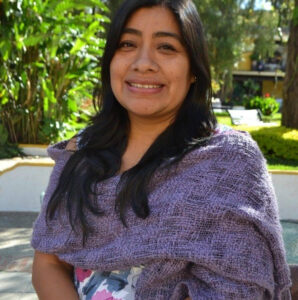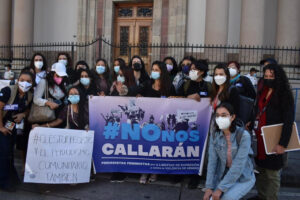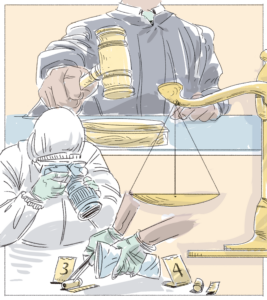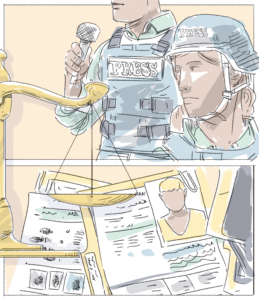By Jody García*
This article has been updated**
This is the third article in a series about the investigation and persecution of cases of violence against journalists in Latin America.***

(Illustration: Pablo Pérez - Altais)
It was September 2014 when Indigenous journalist Norma Sancir took her backpack with her work equipment and went out to cover an eviction in the Camotán community, in Chiquimula, where she lived and worked as a reporter for different local media outlets.
Although she was only carrying the phone with which she was documenting the events, the National Civil Police (PNC, for its acronym in Spanish) surrounded her along with other women, beat her and accused her of attack and public disorder, Sancir said. The journalist spent five days in jail until a court ordered that she be released because there was no evidence that she had committed any crime.
After it became clear that she was just doing her job as a journalist, Sancir denounced the police officers for abuse of authority. The PNC never spoke out about this aggression and various reports have pointed out that agents continue to attack journalists.
Eight years have passed and the justice system has not given her an answer. A judge closed the case without the public prosecutor notifying her of the hearing and although she managed to get the file activated again, impunity has affected her work, Sancir said during an interview with LJR.
Sancir's case is not unique. According to official statistics, with the public prosecutor, more cases of attacks against journalists are archived or dismissed than those that reach the courts. In the last 18 years, only 2 percent (28 cases) of the total cases admitted (1,187 complaints) have obtained a guilty verdict.
Although in 2020 in Guatemala a special prosecutor's office was established to investigate crimes committed against members of the press, the unit has few specialized personnel and the annual budget suffered cuts of up to 68 percent in the last four years, according to reports delivered by the public prosecutor’s office to LJR.
Budget versus lack of response
In 2014, the entity in charge of investigating Sancir's complaint against the police was the Unit for crimes against journalists, activists and human rights defenders and justice operators, an office under the Prosecutor for Human Rights.
Its budget was 14,565,000 quetzales, around US $1,865,000, according to a report delivered by the Budget Department of the public prosecutor (MP, for its acronym in Spanish) to LJR through a request for access to public information.

Norma Sancir (Courtesy)
Despite the financial resources, Sancir never received a response to her case. She even found out that the file was closed in favor of the police officers in a hearing that took place without the MP notifying her that she had to attend, she said. She did not have the opportunity to speak before a judge. The journalist asked an Indigenous organization for support because she considered that her right to petition the court had been violated, according to what Sancir told LJR.
After "putting up a fight," as she describes the dozens of attempts she made, the investigation was taken up by a new prosecutor and the judge who favored the police officers was removed from the case, she described. When LJR asked about Sancir’s cases, the public prosecutor’s office only said it was ongoing.
Although in 2021 the process reached the point where a judge must decide whether to send the agents to trial, this hearing has been suspended on nine occasions.
Complaints that do not become cases
Sancir's situation is not just an isolated case, considers Evelyn Blank, director of the Cívitas Center, a non-governmental organization that has studied attacks against journalists.
“In recent years, complaints have been received about prosecutors closing cases without journalists knowing about it or being consulted. The victims' right to participate in the judicial process is being violated,” Blank told LJR.
The report “Guatemala: State against the press and freedom of expression,” carried out by Cívitas, Article 35 and Article 19, said that 70 percent of the complaints filed by journalists between 2002 and 2010 were dismissed.
At present, dismissal has become the response that the public prosecutor has given the most to complaints of attacks against journalists. In the last three years, almost the same number of complaints have been dismissed or archived as those that have been admitted in the same period of time.
According to statistics from the MP, the dismissals accelerated in 2020 with the administration of Attorney General María Consuelo Porras, who celebrates opening prosecutorial agencies in all the country's municipalities as her greatest achievement, although an investigation by Plaza Pública shows the priority is not to investigate the complaints, but to close them in less than 30 days.
In 2020, 108 complaints made by journalists were dismissed or archived; in 2021 there were 153 and in 2022 there were 46, making a total of 307 dismissals. During that time, 312 new cases were admitted.
Consuelo Porras' strategy to reduce judicial backlog is to close the cases, according to the Institute of Comparative Studies in Criminal Sciences of Guatemala (Iccpg), which carried out a study that revealed that 9 out of 100 cases are resolved favorably to the victim, that there is an overwhelming increase in dismissals and that there is no information on the criminal strategy behind the massive closure of cases.
Porras, who in May 2022 was re-elected as attorney general, created the Liquidating Prosecutor's Office. As in the case of Sancir, there are reports of people who, when asking about the progress of their complaint, find out that it was archived or dismissed. According to an investigation by Plaza Pública, in 45 percent of the cases that were closed, the victims were not notified.
LJR attempted to contact the Attorney General, but did not receive a response at the time of publication.
According to the statistics that the public prosecutor delivered to LJR, 7 out of 10 complaints, for all types of crimes, have that fate.
“I was very upset and indignant about that,” said Sancir, who later sought help from a human rights organization to take up her case.
More institutionality, less resources
Agreement 69-2019, of Nov. 26, 2019, signed by Attorney General Consuelo Porras, created the Office of the Prosecutor for Crimes against Journalists to be in charge of knowing about, investigating and criminally prosecuting crimes committed against journalists at the national level, when the acts have been committed in order to limit their human rights in the exercise of their functions or it is an act of intimidation, harassment or retaliation for their activity.
Before this department was created, it was a small office within the Human Rights Prosecutor's Office that investigated cases against journalists, but also against activists and justice operators.
The first article of the creation agreement says that if the prosecutors determine that the motive for the crime is not a consequence of journalistic work, the complaints will be forwarded to other prosecutors.

Una manifestación de periodistas de Guatemala realizada el pasado 30 de noviembre de 2021. Cortesía de José David López.
According to the creation agreement, the prosecutor's office has a headquarters, prosecutorial agencies and administrative support areas. It also has the support of technicians in criminal investigations when the investigation requires it.
Twenty people currently work in this unit. There is a section chief prosecutor, three prosecutors, nine assistant prosecutors, one executive assistant, one clerk, three officers and two drivers for six vehicles, according to information provided to LJR.
In 2018, the unit for crimes against journalists, human rights defenders, and justice operators had a budget of 23.3 million quetzals.
A year after its creation, the prosecutor's office had a significant reduction in its budget: in 2019 it received 68 percent less funds, decreasing it to 7.2 million quetzales, despite having acquired a higher category in the hierarchy of the public prosecutor’s office. In 2020, 2021 and 2022 the office received minimal increases.
The current budget of this unit is 77 percent less than the one assigned before Porras took office and implemented the strategy of converting the unit into a prosecutor's office.
These figures come from a report from the public prosecutor’s office delivered to LJR through a request for access to information.
"On the one hand, the creation of the prosecutor's office was positive and, on the other, the deterioration in the capacity to investigate was negative," Blank said.

(Illustration: Pablo Pérez - Altais)
How could this go from being a unit with more resources to a prosecutor's office with less funds?, she was asked.
"Yeah, that's pretty illogical, right? But it happened that some of the prosecutors who had been invested in, with training in the prosecution of these crimes, were transferred. In addition, the pandemic affected a lot. There was no staff, there was an almost absolute shortage of resources,” she said.
The lack of resources and judicial response to attacks against journalists causes impunity and that perpetuates the cycle of violence, the researcher emphasized.
In the case of Norma Sancir, this impunity caused her to migrate within her own country and distance herself from the community that was the primary source of her reports and investigations. She now works from Guatemala City.
“With my anger and indignation I was able to continue doing things in journalism, but in the end it gets tiring having to take care of yourself, later there were two other incidents due to the work I was doing. It was a lot of wear and tear and that's why I made the decision to start a healing process,” she said.
Sancir suffered the aggression not only physically and although ten years have passed, not being able to close the chapter because there is no sentence has left emotional consequences.
“To this day I can't sleep well. Sometimes I don't want to cry anymore but it's impossible to get it out of your memory and sometimes when I have to look for information about myself my stomach turns. I wonder what I do in the city when my essence, my passion, was covering communities, but I can't take that risk anymore,” Sancir told LJR.
Effectiveness
The most reported crime by journalists is threats, with 464 cases, followed by coercion with 216, minor injuries with 82, abuse of authority with 45, aggravated robbery with 40, homicide with 37, murder with 36, aggravated robbery with 28, defamation with 19 and extortion 17, among others.
A minimum percentage of the complaints filed by journalists have led to a conviction: in the last eight years, 28 convictions have been reported, one percent of the total, according to the MP report.
Added to this figure are 13 acquittals, including the ruling in favor of former deputy Julio Júarez, accused by the public prosecutor’s office of having been one of the masterminds of the murder of journalist Danilo López, an incident that occurred in March 2015, in which reporter Federico Salazar was also shot.
The seriousness of these murders, which occurred in broad daylight and in front of the headquarters of the Ministry of the Interior, caused journalists to demonstrate and demand the creation of protection mechanisms.
At the request of journalists, the International Commission against Impunity in Guatemala (CICIG), an office of the United Nations to deal with high-impact corruption cases, participated in the investigation of this crime. In the last two years, six former prosecutors and a judge who investigated criminal networks embedded in the State have gone into exile due to denunciations, attacks and even death threats for the work they did.

(Illustration: Pablo Pérez - Altais)
The cases are now in the charge of Rafael Curruchiche, a prosecutor appointed by Porras, who has been questioned for allegedly changing the course of the cases, something he calls "redirecting the investigations to legality."
According to Blank, the case of the murder of the two journalists "fell" in the trial in the same way that other cases investigated by the CICIG are being dismantled.
Although the cases are not resolved, Blank said that the prosecutor for crimes against journalists is effective in responding to small requests made by journalists and mentioned one case in particular.
A community journalist was attacked by a group of police officers and requested security measures before a court. The authorities assigned the same agents as those in charge of protecting journalist Sancir.
Blank contacted the prosecutor's office, where they helped solve the problem. Yet, in Sancir’s case, it has taken eight years to prosecute the police officers accused of assaulting her.
Despite the time, the journalist is hopeful that there will be a trial and a conviction.
"Not for revenge but for justice and dignity and so that the same thing doesn't happen to other journalists," she concluded.
* Jody García is a journalist from Guatemala, part of the Plaza Pública team. She is a stringer in the country for The New York Times. She is a fellow of the Alfred Friendly Fellow program at the University of Missouri School of Journalism. She interested in justice, politics, human rights and migration.
**This article was updated to correct the number of convictions in cases affecting journalists.
***This is the thirteenth report in a project on journalist safety in Latin America and the Caribbean. This LatAm Journalism Review project is funded by UNESCO's Global Media Defense Fund.
Read other articles in the project at this link.
